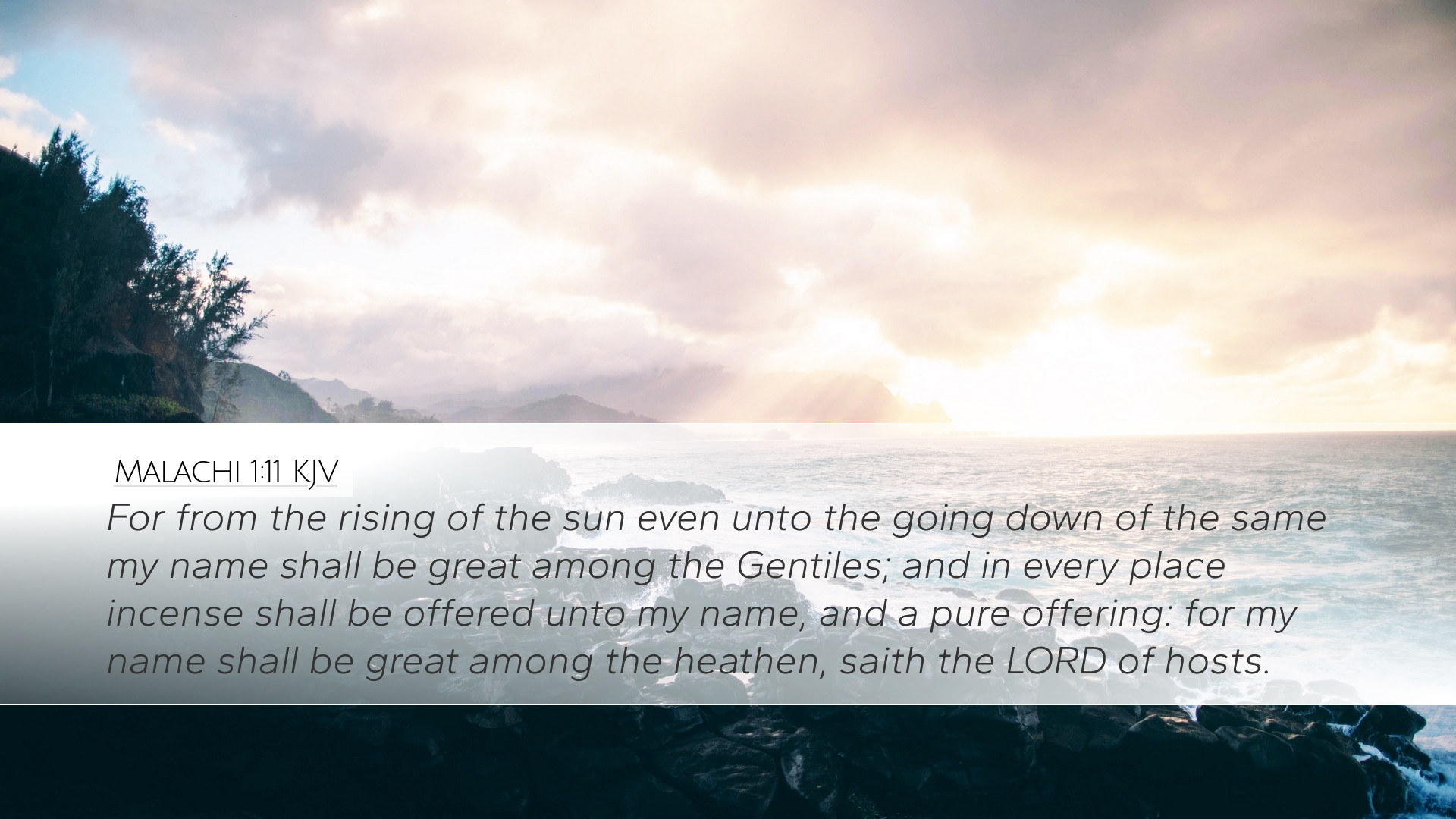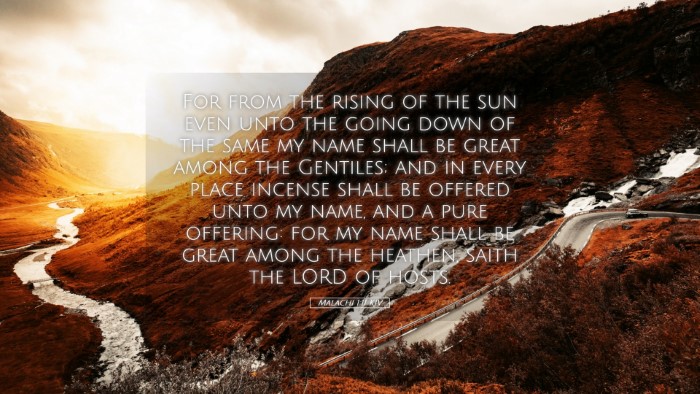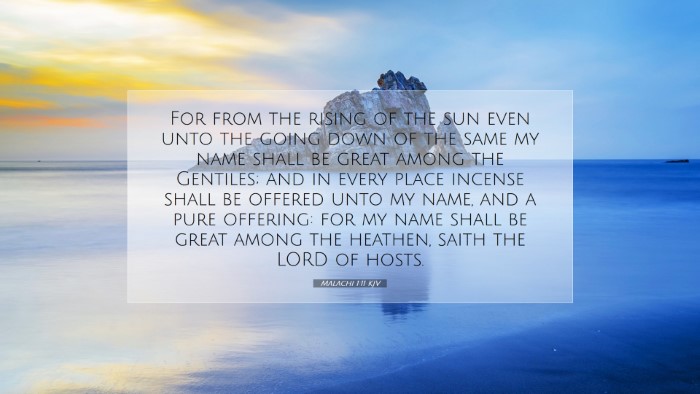Old Testament
Genesis Exodus Leviticus Numbers Deuteronomy Joshua Judges Ruth 1 Samuel 2 Samuel 1 Kings 2 Kings 1 Chronicles 2 Chronicles Ezra Nehemiah Esther Job Psalms Proverbs Ecclesiastes Song of Solomon Isaiah Jeremiah Lamentations Ezekiel Daniel Hosea Joel Amos Obadiah Jonah Micah Nahum Habakkuk Zephaniah Haggai Zechariah MalachiMalachi 1:11
Malachi 1:11 KJV
For from the rising of the sun even unto the going down of the same my name shall be great among the Gentiles; and in every place incense shall be offered unto my name, and a pure offering: for my name shall be great among the heathen, saith the LORD of hosts.
Malachi 1:11 Bible Commentary
Commentary on Malachi 1:11
Verse Context: Malachi 1:11 states, "For from the rising of the sun even unto the going down of the same my name shall be great among the Gentiles; and in every place incense shall be offered unto my name, and a pure offering: for my name shall be great among the heathen, saith the LORD of hosts." This verse is significant as it reveals God's sovereign plan for universal worship and the exaltation of His name.
Overview
This verse encapsulates one of the central themes of Malachi, highlighting God's glory and the response He desires from all nations. The prophet Malachi's message comes during a time of spiritual apathy in Israel, where the people had become complacent in their worship practices, bringing blemished offerings to God. Malachi, a post-exilic prophet, challenges this attitude by proclaiming a future where God's name will be honored across the globe.
Commentary Insights
Matthew Henry's Insights
Matthew Henry emphasizes God's ultimate victory over all idolatry and His sovereign right to demand worship. He notes that the phrase "from the rising of the sun to its setting" illustrates the universal scope of God's glory. Henry argues that true worship should not be confined to a specific location or people; rather, it should be offered in spirit and truth from every corner of the earth. He indicates that the Gentiles (nations outside Israel) would recognize and honor God, suggesting a future where worship extends beyond the physical boundaries of Israel.
Henry also points out the importance of offering a "pure offering." He interprets this as an exhortation for believers to present their best to God. The essence of worship lies not just in rituals but in the heart's sincere devotion to God. The "incense" symbolizes prayers and worship acceptable to the Lord, reinforcing the notion that God desires genuine, heartfelt offerings rather than mere outward conformity.
Albert Barnes' Commentary
Albert Barnes provides a thorough exposition on the phrase "my name shall be great among the Gentiles." He affirms that this speaks of a period of spiritual awakening and recognition of God's greatness by Gentiles. Barnes connects this prophecy to the New Testament era, citing examples where the message of the Gospel transcended Jewish boundaries and reached all nations. He notes the inclusivity of God's plan for redemption, highlighting that the Church emerged not just as a continuation of Israel but as a new entity comprising believers from all nations.
Moreover, Barnes discusses the significance of the "pure offering," interpreting it as a foreshadowing of Christ's sacrificial atonement, which would become the ultimate expression of worship. The offerings of old were types and shadows pointing to the ultimate fulfillment in Christ. Thus, this verse not only calls for physical offerings but symbolizes the spiritual offering of one's life to God.
Adam Clarke's Exploration
Adam Clarke takes a linguistic approach, analyzing the Hebrew terms used in Malachi 1:11. He explains that the term translated as "incense" has connotations of prayer and supplication, which he correlates to the worship practices of both Israel and the Gentile nations. Clarke emphasizes the unity and universality of worship; God desires that all, including the Gentiles, participate in this spiritual communion with Him. He considers it a profound expression of God's grace that nations once excluded from direct worship are now invited to approach Him.
Additionally, Clarke highlights that the promise of God's greatness among the Gentiles sets a tone of hope and restoration for the Israelite audience. It serves as a reminder that God's covenant and mercy are expansive and not limited to ethnic Israel alone. The reference to God's name being "great" speaks to His authority and power, reminding both Israel and the surrounding nations of His rightful place as sovereign Lord.
Theological Implications
This verse holds profound theological implications for understanding the nature of God’s glory and how worship is to be conducted within the Christian community. It reflects the missional aspect of God's character, revealing His desire for all peoples to know Him. Malachi 1:11 can be viewed as a prelude to the Great Commission, where Jesus instructs His disciples to go forth to all nations, fostering a continued emphasis on the inclusivity of grace.
Furthermore, the call for a "pure offering" leads to contemplations about personal holiness and the church's collective responsibility to present its best to God. This reinforces the necessity for believers to engage in self-examination, ensuring that what they offer in prayer and service aligns with God's standards of holiness and sincerity.
Applications for Pastors and Theologians
- Worship Preparation: Leaders should encourage congregations to reflect upon the quality of their worship offerings. This could include examining the state of their hearts and intentions before God.
- Missional Engagement: Pastors can promote an outward-focused ministry that emphasizes sharing the Gospel with all people, demonstrating how Malachi's prophecy aligns with the Great Commission.
- Holistic Approach to Offerings: Teachings on sacrificial offerings should extend beyond financial contributions to include time, talents, and personal lives dedicated to serving God and others.
- Encouragement of Prayer Life: The reference to incense as prayer should encourage believers to cultivate a robust prayer life that is intercessory and focused on invoking God's presence in every aspect of their lives.
Conclusion
Malachi 1:11 serves as a rich text for understanding both God's sovereignty and the universal call to worship. The insights drawn from public domain commentaries underscore the significance of this message in both historical and contemporary contexts. For scholars, theologians, and pastors, this verse is an invitation to examine the nature of worship, the heart of sacrifice, and the reach of God's mercy. It beckons a response that acknowledges God's greatness and aligns worship practices with the divine mandate for purity, inclusivity, and heartfelt devotion.


